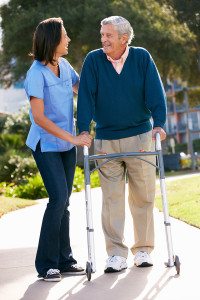How Can You Help Your Senior Feel More Confident with Mobility as They Deal with PD?
Elder Care in Islip NY
If you are like many people you think nothing of standing up and walking across the room to get something that you need, going up and down the stairs, or bending over to pick something up. For  the 1 million people throughout the United States who are suffering from Parkinson’s disease, however, mobility poses much more of a challenge. In your role as a family caregiver for a senior who is living with PD it is important that you acknowledge the difficulties that they have with mobility and help them to manage those difficulties so that they can feel more confident, reduce fall risk, and stay more active and engaged throughout their progression with the disease.
the 1 million people throughout the United States who are suffering from Parkinson’s disease, however, mobility poses much more of a challenge. In your role as a family caregiver for a senior who is living with PD it is important that you acknowledge the difficulties that they have with mobility and help them to manage those difficulties so that they can feel more confident, reduce fall risk, and stay more active and engaged throughout their progression with the disease.
Use these tips to help your aging loved one feel more confident with mobility as they deal with Parkinson’s disease:
- Get them moving. It might seem strange to encourage your aging loved one to do the very thing that they are having difficulty doing, but the only way to help them feel more confident with mobility and to maintain greater mobility during their progression is to get and keep them moving. Simply instilling a sense of importance around the concept of mobility can help your parent to take more control and pursue more ways of moving during their day.
- Move in “non-exercise” ways. Thinking about having to exercise can be daunting and discourage your loved one before they even get started. Encourage them to find ways to move throughout their day that do not seem like exercise but still work their body and improve their mobility. This can include dancing, gardening, organizing, or strolling through a garden or park.
- Find an exercise group. If your loved one is not opposed to the thought of exercise or you want to find a structured way to get them more active, look for an exercise group specifically tailored toward elderly adults. This helps your parent to connect to the community around them and increase their social engagement, which is important to their mental and emotional health, as well as gives them set exercises and movements to do, which keeps their body improving.
- Show them support. Stress and anxiety only increase Parkinson’s symptoms and make it more difficult for your aging loved one. Always be supportive and encouraging when your loved one is being active. Do not rush them or make them feel guilty for taking longer. Take your time, talk with them, and encourage them when they make progress or accomplish a goal.
If your aging loved one is suffering from Parkinson’s disease, starting elderly care for them can be one of the best decisions that you can make as their family caregiver. This elderly home care services provider can step in to fill any care gaps that might exist, give your aging loved one additional support and encouragement, and provide personalized care and assistance tailored to addressing their individual needs and maintaining greater independence, activity, and quality of life. For them this means improves outlook and a more fulfilling, enjoyable lifestyle as they age. For you this means greater peace of mind and confidence knowing that even when you are not able to be with your senior, or are not able to successfully fulfill specific care tasks, they are still getting everything that they need to stay healthy, happy, comfortable, and safe.
If you or an aging loved one are considering elder care in Islip, NY, please contact the caring staff at Family First Home Companions. Serving all of Long Island. Call today: (631) 319-3961
Source: http://www.parkinson.org/understanding-parkinsons/living-well/activities-of-daily-living/increasing-mobility-confidence
- Caregiver of the Month: Kathy - April 8, 2022
- Preventing Colds and Flu in Springtime - March 2, 2022
- Caregiver of The Month: Jacqueline B - February 21, 2022
